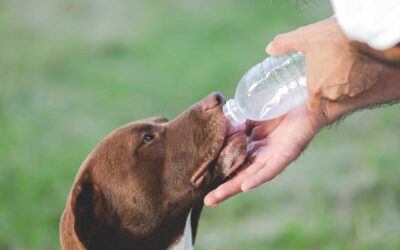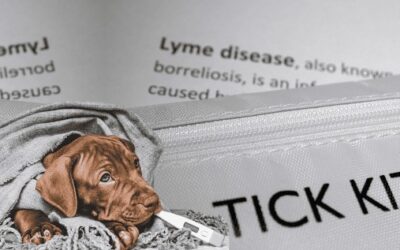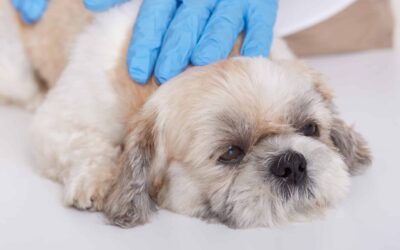Probiotics for Pets

Probiotics are good bacteria. Dogs and all animals have billions of good bacteria in their stomach to help fight infections, strengthen the immune system, and aid digestion. Studies show that gut microbiomes also play an essential role in the nervous system, skin health, obesity, metabolic disorders, and behavior. (depression, anxiety)
Minimizing your dog’s digestive issues while boosting immune health involves more than just a high-quality dog food formula. Adding probiotics is beneficial to guard against intestinal distress, bloat and inhibit the growth and activity of harmful bacteria via live microbial. A dog’s immunity also resides in his gut, meaning that looking after your furry best friend’s gut health may ensure optimal health, vitality, and focus!
An all-in-one approach with probiotic supplementation optimizes digestive health in pets and allows for increased absorption of nutrients to ensure optimal health. Daily probiotic supplements will not only keep your dog’s digestive system healthy but are also believed to treat a variety of illnesses, says The World Health Organization (WHO). They define probiotics as “live microorganisms, which when administered in adequate amounts confer a health benefit on the host,” via WHO.
Because commercial pet food does not specifically meet all our pet’s nutritional needs, it’s key to include nutritional supplementation like probiotics to help with digestive issues. If you give your dog an individual probiotic supplement, it will ensure the correct dosage and efficacy more so than supplements added into commercial dog food formulas.
Studies on the Benefits of Probiotics for Pets
Most scientists agree that probiotics are beneficial to pets and humans. A 2017 study of the gut microbiome adds that “that the ratio of proteins and carbohydrates in a canine’s daily diet have a significant influence on the balance of microbes in its gut. Researchers observed that dogs fed a high-protein, low-carbohydrate diet had enriched microbial gene networks associated with weight loss in humans,” via Science Daily.
Nestle Purina PetCare Company researchers explained that dogs fed a high-protein, a low-carbohydrate diet had decreases in the ratio of Bacteroidetes to Firmicutes bacteria and enriched microbial gene networks associated with weight loss in humans. The microbial responses were more pronounced in obese and overweight dogs than in dogs of a healthy weight.
The Association for Pet Obesity Prevention (APOP) annual survey suggests that more than half of pet dogs are obese or overweight in the U.S. The Purina researchers explain that dogs that ate a low-protein, high-carbohydrate diet had higher abundances of Bacteroides uniformis and Clostridium butyricum.
The impact of diet on the microbiome was more pronounced in obese and overweight dogs than in lean dogs. The study concludes “that obese dogs and overweight dogs are more susceptible to dietary intervention. A different diet for those animals may have a greater impact on the bacterial balance in their guts. The researchers hope to see the research eventually translate into real-world ways to modify pet food, perhaps through the strategic use of probiotics or prebiotics, and reduce the obesity epidemic.”
Another 2018 study says that probiotic bacillus destroys Staphylococcus aureus, a type of bacteria that can result in a severe antibiotic-resistant infection. The study adds that “Probiotics frequently are recommended as dietary supplements to improve digestive health,” says NIAID, Director Anthony S. Fauci, M.D. “This is one of the first studies to describe precisely how they may work to provide health benefits. The possibility that oral Bacillus might be an effective alternative to antibiotic treatment for some conditions is scientifically intriguing and worthy of further exploration.”
Research shows that there is increasing evidence that supports the use of probiotics in pets. Healthy bacteria coming from probiotics in the form of a natural supplement allows for the following:
- Positive impact on liver disease
- Reduces allergy symptoms
- Reduces yeast-associated issues
- Reduces gassiness
- Beneficial for chronic G.I. abnormalities
- Improves bad breath
- Better bowel function regulation to prevent diarrhea and constipation
- Healthy coat and skin condition
- Better health
- Better mood

Types of Probiotics for Dogs
With numerous probiotics for pets and humans, some may be specifically for cats or dogs, while others are for a range of animals. Probiotics can be found in capsules, powders, solutions, and pastes.
Most probiotics will have one or more specific types of bacteria or yeast to tackle a few health issues. There are different strains like Lactobacillus, which is beneficial in increasing the absorption of nutrients. It also helps with digestive problems in dogs.
Choosing a Probiotic for Your Dog
Choosing a probiotic for your pet may seem daunting. There is no one specific probiotic supplement that is best for every dog’s condition. Looking out for certain probiotic strains that have proved to be beneficial through scientific research allows for optimal efficacy in every dog. Here’s a look at the seven best strains:
- Enterococcus faecium
- Lactobacillus acidophilus
- Lactobacillus casei
- Lactobacillus plantarum
- Bifidobacterium bifidum
- Bifidobacterium animalis
- VSL#3
Changes in the Microbiome
The microbiome features a community of microorganisms that include fungi, viruses, bacteria, and other microbes. Our microbiomes and those of our pets can get out of balance. This can happen quickly thanks to low-quality, overly processed dog food, antibiotics, and stress. Because gut health can affect your pet’s well-being, you should consider ways to improve and maintain gut health.
Changes in a dog’s microbiome can make them sick in many ways. This can include:
- Diarrhea
- Allergies
- Obesity
- Gas
- Cramping
- Bloating
- General poor health
- Upset stomach
- Bad breath
Changes in your pet’s microbiome can be caused by numerous things such as the following:
- Antibiotics
- New pet food formulas
- Kittens during weaning
- Stress from a home move or a new pet
- Infections
- Parasites
- High carbohydrate diet
- Consuming foods that are off
If your fur baby seems to get sick often, it could be caused by changes in its microbiome. It’s always a good idea to consult with your vet.
What is a Colony Forming Unit (CFU)?
When choosing probiotics for your furry best friend, you’ll see that there are different CFU counts. CFU counts quantify the numerous live bacterial cultures in a probiotic that are active and can divide to form these colonies.
A higher CFU count does not necessarily mean a better probiotic. To support digestive and immune system health in dogs, lower CFU counts work as well. (3-10 billion CFU)
But to target serious health conditions like IBF, food allergies, post-antibiotic treatment, a higher CFU count is effective. Past research has shown that higher CFU counts are not dangerous to pets.
Probiotics that include a prebiotic like Inulin can benefit the growth of beneficial intestinal bacteria. Gut bacteria convert Inulin and other prebiotics into short-chain fatty acids. These help and nourish colon cells. It improves bowel function and promotes good health.
Additionally, you should consider that these strains are delicate, and exposure to air, moisture, and extreme temperatures will destroy their viability. That said, probiotics should not be left in hot cars for a few hours or exposed to rain. Each probiotic will have different effects on the body.

Lactobacillus Acidophilus
This is one of the most common types of probiotics found in fermented food like yogurts. It’s a bacteria found in the intestines and is also beneficial in treating diarrhea. It has been used in alternative medicine as an effective aid against the effects of antibiotics, chemotherapy, and even hospitalization. Certain strains of Lactobacillus will also be beneficial in improving the frequency and quality of stools in dogs with sensitive digestive systems.
Bifidobacterium Bifidum
Research demonstrated the effects of supplementation in dogs with Bifidobacterium Bifidum in dogs with idiopathic diarrhea. The study concluded that “Nutritional management with the probiotic fed at 2 x 10(10) CFU/day significantly reduced the time to resolution (3.9 +/- 2.3 versus 6.6 +/- 2.7 days; P < .01) and reduced the percentage of dogs that were administered metronidazole (38.5% versus 50.0%) compared with placebo. Probiotic B. animalis AHC7 may provide veterinarians another tool for management of acute diarrhea in dogs,” via PubMed. Bifidobacterium Bifidum can be found in your dog’s intestines.
Lactobacillus Plantarum
This is most often found in fermented food and anaerobic plant matter. It can also be found in saliva. Interestingly enough, this bacterium produces its antibiotics, which also include lactolin, which combats bad bacteria. It also manufactures lysine, which is an essential amino acid. This bacterium does plenty of good things like boost immune system health, lowers intestinal permeability, reduces symptoms of IBS, decreases flatulence, and improves gastrointestinal function for a few months after probiotic use has ceased.
Probiotics for pets are also effective when given a few days ahead of antibiotics. Probiotics withBifidobacterium Bifidum lessens the need for antibiotics by 10%. By giving your dog probiotics on a regular basis, you’ll help keep his GI system healthy by promoting healthy digestion and optimal immune system health.
Trying to find the right vet for your companion? You can read more about choosing a vet that gets your pet here.



